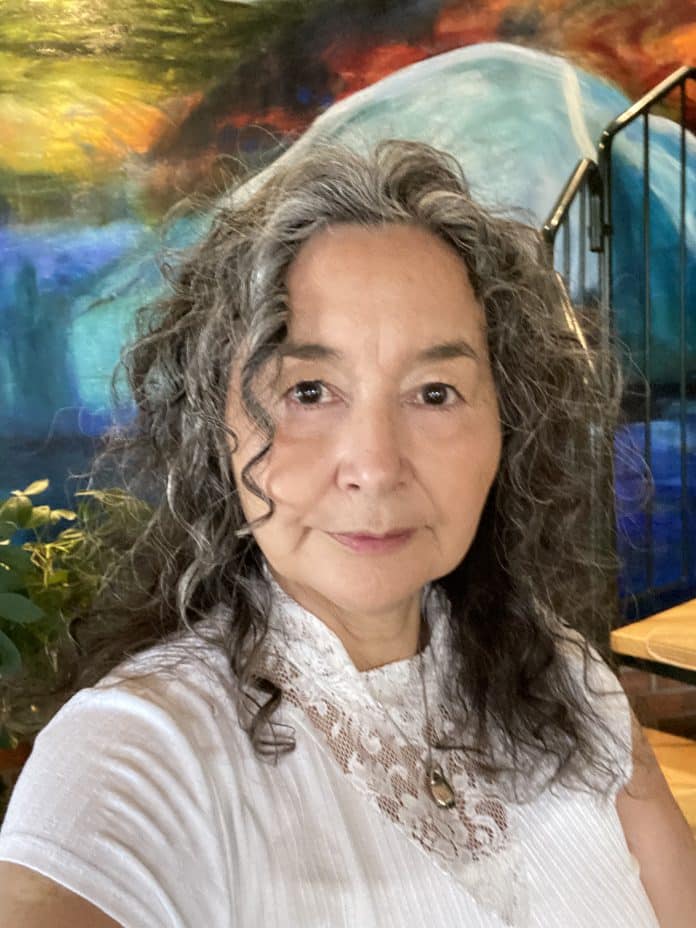Featured in press all over the world, Greenlander Naja Lyberth, 61, is speaking up with a strong, powerful voice, on behalf of herself as a teenager, herself today, and all the thousands of Inuit women forced to undergo painful contraceptive procedures as young girls during the 60s and 70s in Greenland.
In the so called “spiral case”, Danish doctors placed IUDs (a small plastic or copper device that is placed in the uterus to prevent pregnancy) in thousands of Greenlandic Inuit girls and women, often without consent and sometimes without the girls being aware of it, under the direction of Danish government officials. The program was created to control Greenland’s birth rate. The cruel practice has been described as a form of “genocide” by Greenlandic politicians and was carried out as part of annual medical examinations at schools. Naja Lyberth who was only 14 years old at the time describes the incident as taking her virginity. She explains why:
“Our uterus, which is our most sacred internal organ, should be untouchable and it is our human right to have the right to have children and start a family”, Naja Lyberth says. “No government should decide over our uterus.”

A traditional hunting society
When asked about what it was like to grow up in Greenland in the 1960’s, Naja Lyberth is describing a traditional hunting society with gender-segregated tasks in a large family that lived closely together across generations, each gender having their own roles. She was Naja the little sister to 10 siblings, and says her family was no different from any other family pattern of that time. She was raised to be an “obedient” helpful girl who should be part of a community where everyone lends a hand when needed.
“As a girl with feminine survival energies, and expected to be compliant, where it was forbidden to fight back and speak up, I faced significant challenges when I encountered a Danish doctor, who was an authority”, Naja Lyberth states. “My entire upbringing in my culture made it almost impossible for me to fight against the doctor or flee from the doctor. “
After decades of keeping what happened to her a secret, she decided to finally talk openly about it on social media for the very first time around six years ago. She was the first women in Greenland to ever speak publicly about what happened, with a local newspaper publishing an article about it in 2019.
“As a girl and young woman, it was not legitimate in my culture to fight for my individual boundaries – but suddenly I gained the ability to both have my feminine sides and developed the courage to speak up and talk loudly about what we have been subjected to”, Naja Lyberth says in an interview with UNRIC.
Investigation results next year
Today Naja Lyberth is a practicing Greenlandic psychologist and women’s rights activist. In December 2022, she was named as one of BBC’s 100 Women. Due to the 2022 podcast series called “Spiralkampagnen” (‘coil campaign’), launched by Denmark’s Radio, the issue started to gain political traction. According to the podcast, from 1966 to the 1970s, 4,500 IUDs were placed on almost half of the 9,000 childbearing girls and women in Greenland.
Earlier last year, the Danish state and the Greenlandic government launched an impartial investigation that is scheduled for completion in May 2025. In October 2023, Naja was one of 67 women who, via their lawyers, sent a compensation claim to the Danish government. They are seeking 300,000 kroner each.
“It is a gift that we have found each other, and we can heal together – on a soulful and mental level, even though many of us can never be healed physically. We are women who originally had very feminine survival energies, who were victims of male forces, male doctors and male government politicians, as if we were lambs to be victims of wolves.”

Female solidarity means everything
The council of human rights in Denmark awarded you and this campaign the Human rights award 2023. What does this mean to you and the other women affected?
“It means a lot to me and my fellow sisters, whom I work with, who also received the human rights award. It means everything that they believe in our cause and support us, and appreciate our fight, and through the award give us more energy and belief in what we do and fight for”, Naja Lyberth says.
Since the beginning, many more women have spoken out about their suffering. Lyberth has set up a Facebook group where they can tell their stories and find mutual support. Victims describe the many complications they attribute to the IUDs, ranging from painful periods and infections to having their uterus removed. Coming together in a case as important as the spiral case, Lyberth says female solidarity means everything to her, that it is a huge gift that these women have become connected on a deeper level.

“It gives so much empowerment – to regain my own strength and resources to fight for myself and for other women. It is very healing for us to act without powerlessness, guilt, and shame, which were bound and frozen in our bodies for decades.“
In October 2 2023, Lyberth and 66 other women sent a letter to the Danish government demanding 300,000 kroner (around €40,000) each in compensation.
After years of unsuccessful attempts, Naja Lyberth, then aged 35, gave birth to a son of her own.




